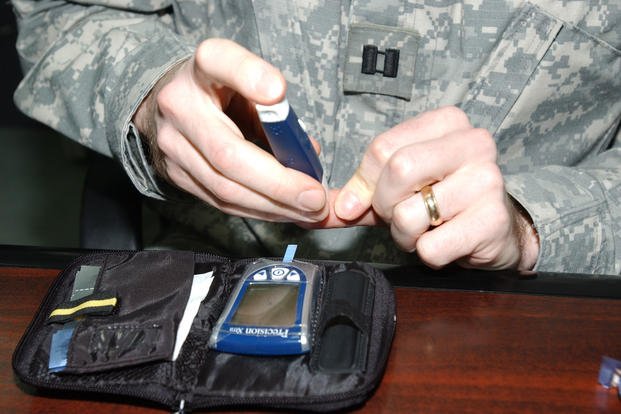Unveiling the Challenge Among U.S. Military Veterans With Diabetes
Understanding the Prevalence: Diabetes Statistics Among Veterans
Diabetes is not just a common health concern; it looms larger within the U.S. military veteran community. Shockingly, nearly 25% of U.S. Department of Veterans Affairs (VA) patients grapple with diabetes, and an estimated three million are believed to have prediabetes.
Identifying Risk Factors: Exploring the Veteran With Diabetes Landscape
Veterans, particularly males, face an elevated risk of diabetes, attributed to factors such as obesity, health disparities, and exposure to herbicides like Agent Orange during wartime. Studies pinpoint obesity as the leading cause, with 80% of veterans wrestling with overweight or obesity.
Tip: Fill out this form to check if you or a friend qualify for CGMs.
A Complex Intersection: Mental Health and Diabetes Risk
Adding to the complexity, two additional risk factors—depression (affecting 11% of veterans) and post-traumatic stress disorder (affecting nearly 13% of veterans)—underscore the urgent need for robust support in managing and preventing veterans with diabetes.
Leveraging Available Resources: Diabetes Programs for Veterans
VA Benefits Administration: A Cornerstone for Medical Care
For veterans diagnosed with diabetes, the Veterans Benefits Administration (VBA) emerges as a crucial resource. VBA extends benefits to veterans who developed diabetes during their service or as a consequence of it.
Factors like physical disabilities, limiting exercise, or mental health conditions like depression or PTSD contribute to qualifying for these benefits.
Read Guide about Wegovy Dosage Guide: The Best Way For Weight Loss
Navigating the Application Process
The application process for VA benefits is accessible, allowing veterans to apply online, by phone, or through mail.
Once enrolled, veterans are connected with a comprehensive healthcare team, emphasizing primary care teams that manage overall health, including diabetes care.
Must Read CGMs in noncritical care hospitals optimizes glycemic control
Beyond Medical Care: Additional VA Resources
The VA goes beyond medical care, offering diverse resources recognized by the American Diabetes Association (ADA).
The Diabetes Self-Management Education and Support (DSMES) program, jointly developed by the Department of Defense and Veterans Health Administration, has received ADA recognition. Attendees experienced a notable average A1C reduction of 1.2%.
Broadening Horizons: Diabetes Resources Beyond the VA
Peer Counseling and Support Groups
Beyond the VA, various services and resources exist at the local level. Peer counseling and support groups have proven beneficial for veterans with diabetes, fostering improved health-related quality of life and better chronic disease control.
Online Platforms and Telehealth Services
Online platforms like Reddit and telehealth services offer veterans avenues for anonymous discussions and quick access to healthcare professionals and therapists. These resources ensure flexibility and ease of interaction for veterans seeking additional support.
Educational Workshops: A Knowledge Oasis
Some universities, such as Michigan State University, provide free diabetes management workshops, bridging the gap for both veterans and non-veterans. These workshops equip individuals with valuable insights into living with diabetes.
Mitigating Risks: Proactive Steps for Veterans
Weight Management and Lifestyle Changes
Given the strong correlation between obesity and diabetes, veterans with diabetes can proactively lower their diabetes risk by achieving and maintaining a healthy weight. Lifestyle changes and incretin-based therapies play pivotal roles in this endeavor.
Also, read about Analyzing Urban-Rural Disparities in CGMs Use
Nutrition Counseling and Physical Activity
Engaging with a dietician for diabetes-friendly meal planning and seeking guidance from a physical therapist or personal trainer can establish sustainable health routines. The VA offers one-on-one nutrition counseling, allowing veterans to self-refer to these programs.
Mental Health Management
Managing mental health is paramount in reducing diabetes risk, especially for veterans with post-traumatic stress disorder (PTSD). Addressing inactivity and antidepressant use, crucial factors tied to PTSD, becomes essential in diabetes prevention.
Smoking Cessation Programs
Not smoking significantly contributes to lowering diabetes risk. The VA offers tailored programs, including a “quitline,” providing tobacco cessation counseling to veterans under its care.
Supporting Veterans With Diabetes: Tips for Friends and Family
Education and Encouragement
Friends and family can make a difference by educating themselves about diabetes care and complications, offering encouragement, and participating in activities that promote a healthy lifestyle.
Understanding and Patience
Recognizing the emotional and physical challenges of managing diabetes, friends and family can provide understanding, patience, and empathy as crucial elements of support.
Practical Assistance
Assisting with tasks like grocery shopping, transportation to medical appointments, and preparing diabetes-friendly meals can significantly ease the daily life of a veteran with diabetes.
Leveraging VA Resources
Family members and friends can explore and encourage veterans to utilize VA resources, including diabetes management education and support groups, both online and in person.
Emotional Support and Communication
Offering emotional support, encouraging open communication about feelings and concerns, and being prepared for emergencies contribute to a holistic support system.
Conclusion: A Holistic Approach to Veterans With Diabetes
Supporting U.S. military veterans with diabetes involves a multi-faceted approach, combining preventive measures, resource utilization, and understanding. By leveraging benefits from organizations like the VA, engaging in peer counseling, and addressing risk factors, veterans can effectively manage diabetes and lead healthy, fulfilling lives.


